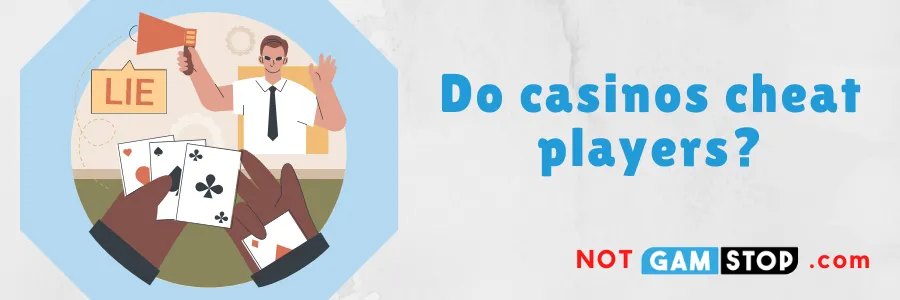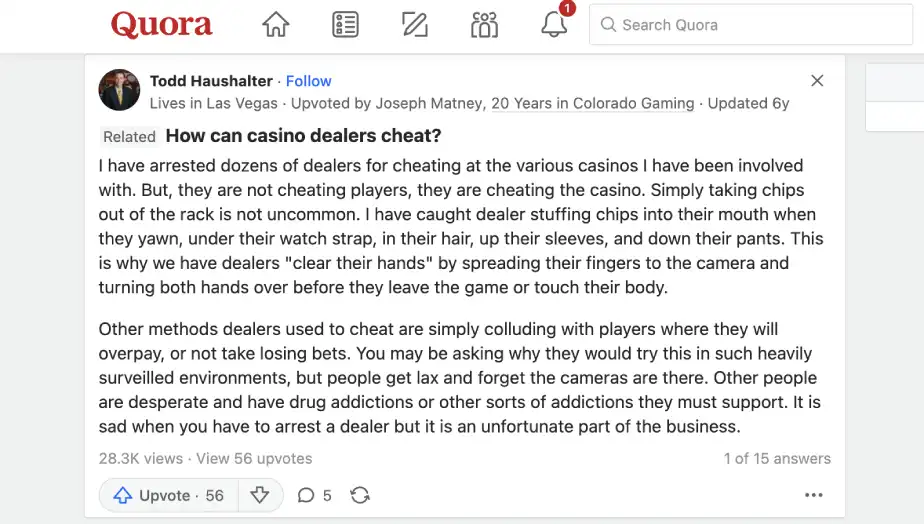
Gambling has always been shrouded in an aura of mystery and distrust. Periodically, the media highlights major scandals related to cheating in casinos, which only fuels players’ concerns. Gaining customers’ trust in the fairness of gambling establishments is crucial, and many wonder: do casinos play fair?
At which games do casinos cheat the most?
How do casinos cheat at blackjack?
Blackjack gives experienced players a real chance to outperform the casino, since with perfect play, the house edge is only 0.5-2%. However, some unscrupulous casinos use underhanded methods to substantially increase this advantage in their favour by cheating players. Below, we have highlighted cheating methods that disreputable casinos may employ:
- Selective Shuffling: Is one method demonstrating do casinos cheat at blackjack: if a player is winning too much, the dealer may prematurely reshuffle the deck, changing the game’s outcome.
- Over-Shuffling: Excessively fast shuffling makes it difficult for players to keep track of the process. The goal is to enhance the casino’s edge and confuse players.
- Removing Winning Cards: In this unscrupulous trick, all high-value cards needed to win are removed from the deck, substantially reducing the player’s chances of winning.
- Miscounting Chips and Cash: The dealer may intentionally miscalculate payouts, cheating the player out of legitimately won money.
- Special Devices: Some casinos use secret gadgets to peek at players’ cards or otherwise cheat.
- Distracting Manoeuvres: Attracting attention to alcohol, daubing cards, swapping out winning hands, and other ploys are used to mislead players.
How do casinos cheat at roulette?
Roulette gives the casino an inherent edge ranging from 1.35% to 5.26%, depending on the game version, but some players still ask, do casinos cheat on roulette? Since some gambling establishments are willing to go all out, using deceptive tactics such as:
- Wheel Modification: Loosening certain parts of the roulette wheel, creating a bias that causes the ball to land more frequently on specific numbers.
- Magnetic Balls: Using a magnetic ball or a ball with a special coil that allows cheaters to influence its trajectory and steer it towards the desired area of the wheel.
- Dealer Collusion: Collusion between the dealer and a player, where the dealer intentionally miscalculates payouts, pays losing bets, or allows late bets.
- Sector Targeting: A method where the player tries to track the ball’s motion around the wheel to estimate the approximate area where it will land.
- Laser Devices: Using lasers and microcomputers to calculate the ball’s trajectory and speed to predict the number it will land on.
- Past Posting: When a player quickly adds or replaces chips on the winning number after the ball has settled.
- Rigged Wheels: Using rigged wheels with pre-programmed biases in underground casinos to systematically defraud players.
Do casinos cheat on slot machines?
- Lowering the RTP (return to player percentage) on slots: Unscrupulous casinos resort to dishonest practices, intentionally lowering the return to player (RTP) percentage on slots below the level set by the game software developer, in order to extract greater profits at the expense of player losses.
- Exploiting vulnerabilities in slot source code to rig favourable outcomes for the casino: There have been cases where programmers with access to the source code abused their position for fraudulent purposes.
- False advertising: Another method may involve misleading promotional campaigns about the payouts or odds of certain machines, luring players with promises of higher chances to win than is actually the case.
It’s important to note that while such methods are possible, they are extremely illegal and not characteristic of the practices of legal, regulated casinos. Most modern casinos operate in accordance with strict rules designed to ensure fair play and transparency. Players are advised to gamble responsibly and only at casinos that are licensed and regulated by reputable authorities.
Do casinos cheat at baccarat?
The house edge in Baccarat ranges from 1.01% to 15.75%. Historically, in less regulated environments, both players and casinos have been known to engage in cheating. Understanding how do casinos cheat at baccarat can help players be more vigilant. Here are several methods that have allegedly been used or discovered in the past:
- Card Marking: Players or unscrupulous casino employees might mark cards to identify their values from the back, giving them an unfair advantage in predicting the game’s outcome.
- False Shuffling: The dealer might perform a shuffle that appears genuine, but actually arranges the cards in a way that benefits the house or a collaborating player. This technique is known as a “false shuffle”.
- Cutting to a Specific Card: In some instances, particularly in private or less scrutinised games, a dealer might be skilled enough to cut the deck, so a specific card is dealt at a strategic point.
- Using Technology: There have been cases where players used technology, such as hidden cameras or electronic devices, to predict or influence the game’s outcome. The use of such technologies by casinos is highly unlikely, as it would be illegal and subject to severe penalties.
- Collusion: Players might collude with dealers or other casino staff to cheat, which could involve any combination of the above methods or simple tactics like signalling to influence betting decisions.
Consequences for casinos
However, cheating is fraught with serious consequences for casinos. Lawsuits and massive fines become inevitable if the fraud is exposed. Regulatory bodies may also revoke the casino’s licence and tighten inspections. However, the loss of reputation and players’ trust can cost them far more than any short-term financial gain.
Warren Buffett once said, “It takes 20 years to build a reputation and five minutes to ruin it. If you think about that, you’ll do things differently”. This quote accurately describes the situation faced by several gambling establishments caught on the web of deception and fraud.
- The Woodbine Casino in Toronto was fined $80,000 for a cheating scheme involving dealers in an electronic dice game.This incident illustrates that casinos might employ deceptive practices in various games, raising concerns about whether how do casinos cheat at craps. The inspection revealed serious violations of procedures and a lack of effective oversight.
- Crown Casino paid a $300,000 fine for illegally modifying poker machines to hide betting options, leaving only minimum and maximum choices. This incident led many to question, do casinos cheat at poker?The regulator ordered Crown to upgrade its compliance system.
Preventing fraud
Do online casinos cheat players despite the use of complex algorithms such as the random number generator (RNG) and fraud detection systems? Reputable licensed casinos invest significant resources in ensuring fairness.
To prevent fraud, casinos conduct thorough staff screening and training and use modern surveillance systems. Players also play a crucial role in combating fraud. Awareness of potential scams, choosing reputable and licensed casinos, vigilance, and promptly reporting any suspicious activity can help curb cheating.
Cheating methods
The use of rigged roulette wheels, marked cards, loaded dice, and other dishonest tactics is just the tip of the iceberg. Some casinos may resort to tricks like false deals, shuffles, or cutting the deck to retain desired cards. In extreme cases, unscrupulous dealers may collude with players, intentionally losing or winning certain hands.

Cheating methods casinos may use
Some unscrupulous casinos resort to various fraudulent methods and tricks for ill-gotten gains. It’s important to know these deceptive tactics to recognize signs of unfair play and protect your rights as a player.
In Land-Based Casinos:
- Rigged roulette wheels, including the use of counterfeit wheels.
- Card dealing fraud, such as dealing cards not from the top of the deck or using special techniques to maintain a desired deck order.
- Employing fake shuffles and cuts to keep certain cards in a desired order.
- Using cards that deviate from the standard composition.
- Employing a “cooler” deck and manipulating dice.
- Playing by rules unapproved by regulatory bodies.
- Operating slot machines that pay out below the legally mandated minimum.
- Defrauding consumers through false advertising and failure to honour promotional offers.
In online casinos:
- Using counterfeit software reduces the chances of winning or disrupts the RNG’s operation.
- Delaying or refusing to pay out winnings.
- Employing opaque or hidden terms that make it nearly impossible to withdraw winnings or claim advertised bonuses.
- Fake licences and data.
- Pirated software.
- Promising high bonuses for registration or deposit that turn out to be inaccessible due to excessive playthrough requirements or hidden terms of use.
Regulatory Bodies
As mentioned above, ensuring fair play in casinos is the responsibility of specialised organisations that regulate honesty and compliance within the gambling industry, both online and offline. Some of the most reputable regulators include:
- Malta Gaming Authority (MGA)
- UK Gambling Commission (UKGC)
- Gibraltar Regulatory Authority (GRA)
- Curacao eGaming
These organisations ensure that operators adhere to strict standards of fairness, security, and player protection.
